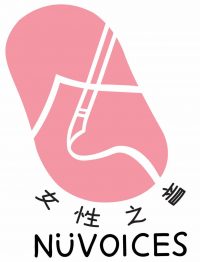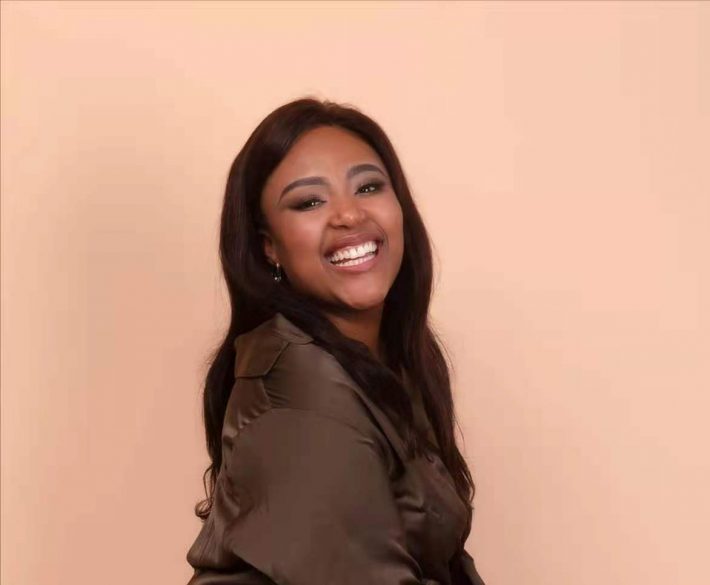BY ELYSE RIBBONS
NüProfile is a column featuring conversations with diverse creators working on China-related subjects.
“Being black in China is also a blessing that I don’t take for granted,” Lerato Mathibe says.
Not every black person who has traveled in China has necessarily felt that way. But poet and educator Mathibe, who has been working as a teacher in Nanjing for the past two years, brings a unique perspective to China.
Mathibe’s journey from her native South Africa to China called upon her to put her words to paper and write her first chapbook of poetry, Baby Steps. The poems document her first steps towards self-discovery and empowerment, as well as embracing her Feminism, Blackness and Spirituality. Tied together with a strong thread of social activism, her words carry an inclusive message and have been heard in live poetry performances on stages in both South Africa and in China. In an interview with NüStories she shares her thoughts on poetry, feminism and blackness in China.
Currently, you live in Nanjing, but where is Home for you?
Home is in South Africa, in a small town called Nigel, which is near Johannesburg.
How are your South African roots reflected in your poetry?
Very vividly. I tell stories from my own experiences, and from my own observations. And so, a lot of who I am stems from my ethnicity and my nationality. Moving from home to China, I’ve been given the opportunity to present my culture to the world. And so, my poetry reflects that. It reflects who I am as a South African Black woman, it reflects my faith.
What does the word “feminism” mean to you?
The word feminism means equal playing ground. It means an arena to be who I am: without boundaries, without judgement. It means freedom. Feminism means freedom to be without any boxes.
Why did you choose the name Baby Steps for this book of poetry?
I chose Baby Steps because it represents progress. Baby steps are the little everyday bits of progress that we make as human beings. And it’s something that’s so powerful, because it gets added up. But if we neglect the baby steps, if we don’t celebrate them, if we are not mindful of them, we can easily just get lost in the ebb and flow of things. So, for me Baby Steps is really about owning your journey, every step of the way.
What is your day job? And how does this affect your poetry?
My day job is teaching English to kindergarteners, aged five to six. And how does that impact my poetry? I guess being childlike is one of the elements of all artists. I think we have that perspective, that other adults might not have. That it comes from a place of purity. And so, being with children and seeing the world through their eyes, where everything is new, everything is so fresh, you know, and just going back to that. Being surrounded by that, it allows me to also visualize the world with a sense of curiosity, to always just be open to learning, to experiencing, to feeling, to asking, and that then lays a very strong foundation for my poetry.
When did you first discover poetry?
Poetry is in my culture. It’s rhythm, it’s rhyme. From church, from school, there’s always cultural performances that are poetic, called ibizo. It’s just that as a child, there aren’t any labels. So, you’re exposed to this, but you don’t know what it is. And then later, as you go through the journey of socialization, then you start to label things. Like this is poetry, but it’s always been there from my lullabies as a child. And stories, we call these nursery rhymes, inganekwane.
So, it’s always been there. And then when I became conscious to the fact that it’s poetry, I would say it was when I was in primary school, in grade five. It was something that helped me to own my voice, to build my confidence. And then I started to incorporate it within my communication with my God. So, it became very personal. It was no longer just like: oh school, we’re competing, we’re doing poetry. We’re writing a poem and we presenting it in front of the class. It became a language between myself and my Savior.
Are there any poets or musicians or other writers who directly inspired your poems for this book?
Koleka Putuma is one of them. She’s also a South African poet. Maya Angelou, of course. Christi Steyn – I just discovered her recently. She’s very whimsical and I love her poetry. Also, Jill Scott , Lauryn Hill , Lebohang Mashile, Zoe Modiga and my mom , Sibongile Mathibe.
I noticed the word “indigenous” appears in a lot of your work. Both China and Africa were colonized by Europe – have you had any conversations with people here in China about that?
Yes. I think as a Black person, it’s easy to take the victim mentality and think “Oh, it only happens to us,” but when you see that there’s a lot of people (you realize it happens a lot) whether it’s (about) race or gender or religion. There are so many isms, that don’t belong in whoever’s agenda, whoever’s mandate. There are so many groups that are marginalized, that are the minority, but it’s an illusion. And, all of us are marginalized somehow.
If we are just naked with ourselves about who we are and we just define ourselves in a way that will bring about enlightenment and will bring about the highest truest version of ourselves, then we won’t feel marginalized because it is systemic. But you also have somewhat of a choice to create your own liberty.
What is it like being a black woman in China?
The first challenge is that everyone here is just so petite. So, with clothes, nothing fits. There is nothing that can accommodate my shape, you know? And then the staring, everyone just staring. But I’ve just learned to be on some celebrity mode like paparazzi. And that’s in public, and then in the workplace, there’s a lot of strategy that needs to be employed when it comes to the gender pay gap, the nationality pay gap, the accent pay gap, all of those things.
Understanding these dynamics is something that I’ve had to teach myself. I think it’s the same for every woman – we have to understand the system and how it wasn’t built for us. And so it’s constantly like breaking glass ceilings, constantly proving a point that I’m here and I belong here and it’s about being confident and showing up and taking up space. Not just for myself, but (also) for the others that follow me.

About Lerato Mathibe
Mathibe is an artist of life, social justice activist and teacher from Nigel, Gauteng, South Africa. She believes in the power of writing for healing and creating new worlds. From the moment she learnt to write, she started praying through pen. Her prayers postured as poetry. When she realized that God is a poet, it only made sense that she, His daughter, resemble Him. And that’s how she started documenting her experiences, thoughts ,hopes and conversations in rhythm and rhyme. Her poems are lived experiences of women, particularly black women. Through prose and poetry, she celebrates every season of women’s femininity. She takes you through her journey of baptism as a clarion call to return to your own priesthood.
Follow her on Instagram and read her book here.
About the author
Elyse Ribbons manages a theater in Chengdu, China and writes on culture, people and tourism. You can find her on Douyin @天府之老外, Tiktok @elyseribbons or Twitter @iheartbeijing

